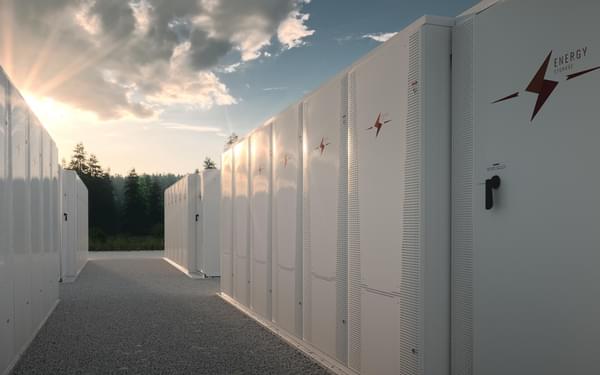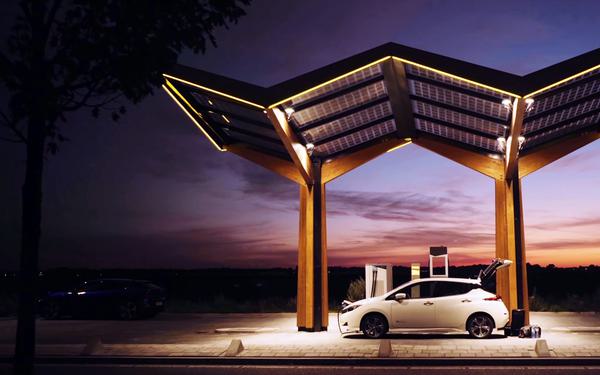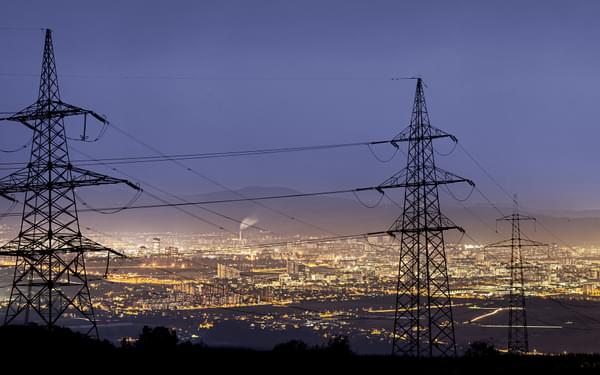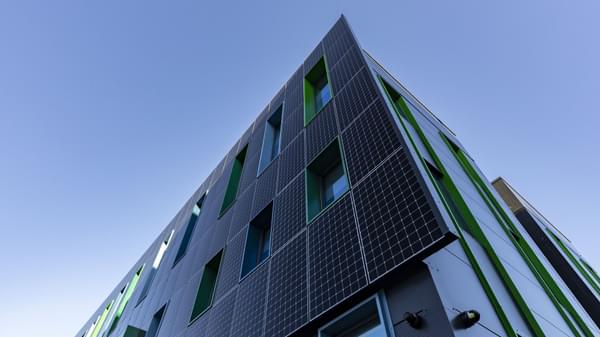Energy
The climate crisis represents one of the greatest challenges humanity has ever faced. We've an unmissable window to make both the built environment and our energy infrastructure cleaner, greener and more sustainable in the longer-term.
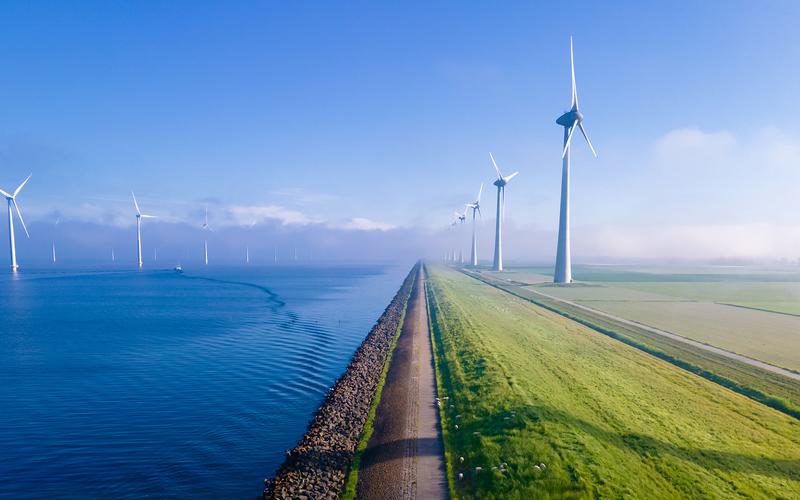
Limiting carbon emissions and the global temperature rise to 1.5 degrees is a mission we must make central to our thinking and decisions. With the energy supply sector and built environment responsible for the vast majority of all global emissions, we have a responsibility to develop new and innovative ways of decarbonising.
Energy transition is about challenging the status quo, and looking more critically at how we produce and consume energy, with the aim of decarbonising all aspects of the energy lifecycle. Energy transition will become a vehicle for us to re-evaluate how our communities are built, how we generate and consume energy, and to amplify social value. It's our route to delivering climate resilient places.
We pride ourselves on our holistic and integrated approach to energy transition. We understand both the impact and opportunities that come with generating, storing, and consuming clean energy, and the needs of a wide range of stakeholders including developers, investors, local authorities, and companies of all sizes.
We know your needs will be unique to your particular energy requirements, and so we guarantee a tailored approach to meet your needs. However you may find there are common themes that unite your needs with the needs of many of our clients.
Environmental, social and governance (ESG) and net zero plans are vital to energy transition.
By capturing aspirations and translating them into implementable plans, relevant to each organisation, we can accelerate progress and unlock new opportunities. These strategies are already becoming increasingly important in attracting talent and in accessing finance.
Funders and investment partners use the non-financial factors of ESG to assess whether a development project, or a real estate portfolio is right for them. Increasingly, built environment assets will be viewed through a social lens to evaluate the everyday impact on people’s lives. In the built environment, clear strategies will help guide everything from retrofitting offices, to designing future proof EV charging infrastructure, and selecting the right energy mix at local and national scales.
Our team will help you to understand and articulate your business’s vision and purpose with respect to ESG and net zero carbon, keeping your business relevant in a rapidly changing world.
This includes whole lifecycle services that encompass strategy development through to implementation.
- ESG consultancy services to develop a strategy that reflects the vision and purpose of your business.
- Strategic energy and sustainability consulting advice to inform masterplanning development.
- Cost-effective roadmaps and implementation of long-term carbon management programmes.
- Comprehensive greenhouse gas reporting and consultancy services.
- Building performance optimisation leading to reduced operational energy bills.
- Carbon verification and validation services offering credibility to your carbon footprint claims.
The embodied carbon from creating new structures and the emissions associated with their construction is vast.
This represents one of the largest opportunities for significantly decarbonising our planet and the results can also have other considerable benefits to your organisation’s reputation.
There’s a major drive within the UK building and infrastructure sector to commit to quantifying, managing and reducing the environmental impact of activities throughout the asset lifecycle.
But for this to be successful, it requires robust methodologies and verifications so that any claims made in the public view, which could be met with cynicism or fall under scrutiny and represent a business risk, can be backed with evidence.
We support clients by:
- Conducting embodied carbon assessments on new structural designs. This enables informed decisions on options to reduce carbon emissions at the earliest stage of a development.
- BIM and Modern Methods of Construction (MMC) offer tangible opportunities to increase efficiencies and reduce costs through the construction process.
- Supporting developers with planning for and implementing lower carbon intensive construction vehicle fleets, including wider use of electrified and hydrogen powered plant and machinery.
Regulations are tightening, and we can increasingly see that tenants and investors are demanding high performance, smart buildings.
As specialists in energy, sustainability and engineering design, we help by optimising the energy performance of existing assets, resulting in lower energy usage, reduced carbon emissions and the avoidance of stranded assets.
Estate optimisation can mean different things depending on where you are in the property lifecycle. It typically covers, optimising buildings, creating realistic building performance models, retrofitting and achieving net zero buildings and post occupancy evaluations
We add value by:
- Developing sustainable, energy efficient and futureproofed assets that meet net-zero goals.
- Reviewing existing estates to understand current performance levels and recommending areas ripe for optimisation.
- Carrying out EPC certificate reviews, with recommendations for energy efficiency and decarbonisation.
- Helping to meet comfort requirements via enhanced wellbeing from our air quality and acoustic services and enhanced safety via our fire safety team.
- Developing energy self-sufficient building and wider masterplan concepts, to support local and regional decarbonisation initiatives.
Creating resilient energy networks has never been more important in the face of sustained energy price rises and global instability.
The key to relieve pressure is to find the right zero carbon energy mix at a local and national level, whilst ensuring security of energy supply. This will consist of renewable microgrids which in turn consist of at least one type of energy generator serving a specific site or local area. The microgrids will be supported by battery storage technology, offshore and onshore wind farms and nuclear reactors at different scales across the UK.
In the case of nuclear, the UK Government has made a strong commitment to both gigawatt scale and also Small Modular Reactors, recognising the low carbon, secure energy supply and low overall lifetime cost credentials of this form of electricity generation, as well as the opportunity to use excess heat to support hydrogen production.
This change is going to create vast opportunities and will require a skills revolution. Microgrids will provide ways for estates to decarbonise and create additional revenue streams while new nuclear reactors could support a supply chain and jobs across the UK for decades.
We are well placed to enable these changes to happen.
- Techno-economic modelling to assess the viability of on/off site energy generation and storage.
- Energy capacity, resilience modelling and strategic investment advice.
- Life cycle assessments and costing.
- Infrastructure design and planning and positioning of energy infrastructure.
- Environmental permitting for low and zero carbon technology.
- Strategic utility management services and advice on energy grants and funding.
- Early fire safety advice to ensure compliance and high standards of safety.
- Advice and support on the justification, generic design assessment and siting of new nuclear facilities at all scales, as well as the opportunities for co-generation.
The future is electric – electric cars are here to stay and increasingly proposals for hydrogen buses and trains are being made.
This is an exciting future where it is even possible that ‘Mobility as a Service’ offerings erode car ownership. Deploying the correct zero carbon infrastructure that will effectively support the transport needs of a community is vital, which is why Hydrock is providing data-led insights to inform investment strategies for our clients, including:
- StratEV, exclusive to Hydrock, an advanced EV charge demand modelling service, which avoids over-specifying and over-spending on EV charging infrastructure.
- Strategic masterplanning advice to provide communities and businesses with the transport provisions they require.
- Densification advice for designed transport hubs containing a blend of transport provisions, including e-scooters, bicycles, trams and trains.
- Mobility modelling capabilities to predict the demands on road infrastructure to a high degree of confidence.
- Ensuring energy networks are able to cope with new demand for widespread electrification of transport and building services.

